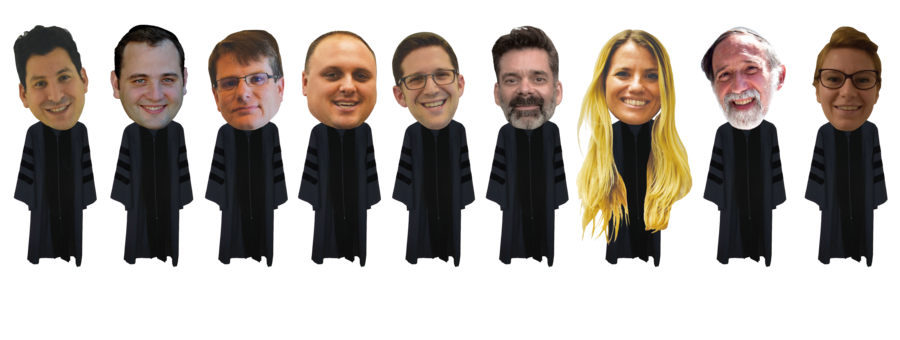BP Graphic By Zev Kupferman and Alyssa Wallack
Doctors in the house
From biology to Torah to political theory, Shalhevet's faculty advances knowledge
November 7, 2017
What do stem cell differentiation, females with disabilities in the classroom, the relationship between Jewish and American law and a medieval Greek rabbi’s Talmud commentary have in common?
They are all topics of doctoral research by Shalhevet faculty members.
Currently, there are five faculty members who have finished their doctorates — one recently — and four more whose are in progress. Five have or are pursuing Ed.Ds — the degree of Doctor of Education — and four have or are pursuing Ph.Ds, or Doctor of Philosophy.
“An Ed.D. is more of a professional degree” for educators, said Dr. William Walton, Ed.D., who is Math Department chair and Director of Curriculum and Instruction.
“With a Ph.D., you’d be required to take two languages, and in an Ed.D. program you don’t have to do that,” Dr. Walton said. “An Ed.D. usually has a more focused dissertation, focused on a specific problem, whereas a Ph.D. dissertation would tend to be more academic.”
Judaic Studies teacher Rabbi Abraham Lieberman is currently working towards his Ph.D., while science teacher Dr. Elizabeth Basheer, history teacher Dr. Keith Harris and part-time law and religion teacher Dr. Avi Helfand already have theirs.
Along with Dr. Walton, Principal Dr. Noam Weissman has received his Ed. D., while Education Support Coordinator Ms. Ashley Evins, Judaic Studies teacher and Mashgiach Ruchani Rabbi David Block, and General Studies Principal Mr. Daniel Weslow are working on it.
Whatever differences there may be between Ed.D.s and Ph.D.s, both require the writing of a dissertation based on original research. Here are the topics studied by Shalhevet’s faculty members.
Science teacher Dr. Elizabeth Basheer received her Ph.D. in Chemistry in 2013 from the University of South Carolina.
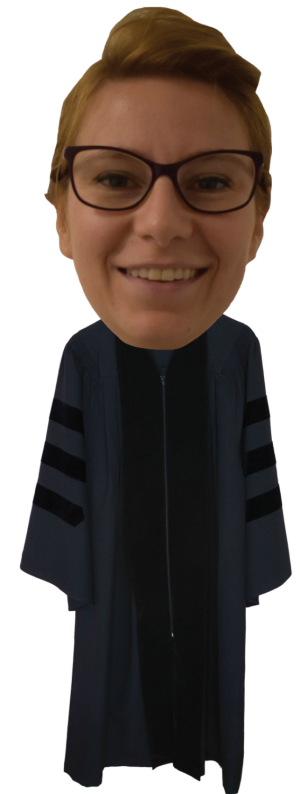
For her dissertation, titled Plant Based Materials for Cell Alignment and Differentiation, she studied stem cells, and specifically how they differentiate on a virus-coated surface.
Dr. Basheer said she was trying to induce the stem cells to become smooth muscle cells, and induce mesenchymal stem cells to become bone cells, which with more research, may have resulted in artificial blood vessels.
Some cells — for example, aortic stem cells taken from the aorta of an animal — become, or align with, the type of cells you attach them to.
“You can take aortic stem cells, and whenever you put them on a nano-aligned surface, you can induce alignment in them,” Dr. Basheer said. “They can sense the nanostructure and then align to that nanostructure, which is interesting because it’s really small. For a cell to sense something that small is quite interesting.”
So Dr. Basheer tried using cells coated with viruses, which are also very small. It didn’t work, but in disproving her theory, she discovered that virus-coated surfaces do not induce differentiation in smooth muscle cells.
That matters because researchers have high hopes for stem cells, and being able to use them means understanding how and where they can be coaxed into differentiating into the kinds of cells that doctors want.
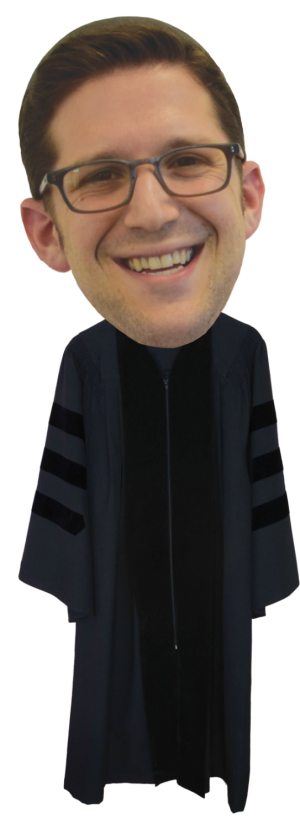 Rabbi David Block, Judaic Studies teacher and mashgiach ruchani, is pursuing an Ed.D. in Educational Leadership and curriculum development at Yeshiva University. He is studying the larger question of why Jewish History is taught and learned today.
Rabbi David Block, Judaic Studies teacher and mashgiach ruchani, is pursuing an Ed.D. in Educational Leadership and curriculum development at Yeshiva University. He is studying the larger question of why Jewish History is taught and learned today.
Rabbi Bock has tried to find out if there are any strategies and philosophies that were used to frame Jewish history in the past, and to see if they are still relevant today, as well as understanding the religious value behind studying the subject.
“Here at Shalhevet, and many other places, Jewish History is a part of the Judaic Studies curriculum, which means it’s up there with Tanakh, with Talmud,” Rabbi Block said. “There’s something religious about it, as opposed to just learning the history of our nation, which would not necessarily be a religious thing. We want to keep the academic rigor, but we also need the religious value.”
He’s looking at curricula, understanding how they were written, what is studied and how it’s learned.
In his research, Rabbi Block has been surprised that historians struggled with the same question about the subject’s relevance and importance that he is asking today.
He has also noticed that no one has created a Jewish history curriculum whose target audience is Modern Orthodoxy. He plans to write one himself, in addition to the regular academic, written portion of the dissertation, and to be done writing in a year.
Ms. Ashley Evins, Education Support Coordinator, hopes to finish her Ed.D. at USC later this month.
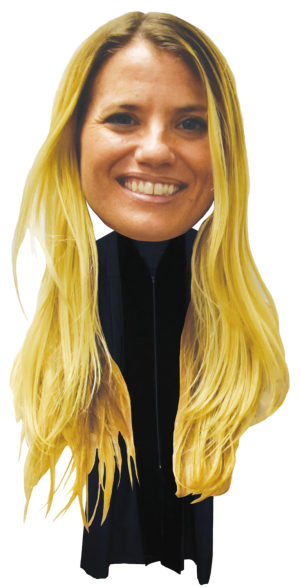 Her subject is Special Education and she is writing her dissertation on how females with disabilities are understood in the classroom — in particular, whether teachers notice when women and girls need help based on their own perception of disability, race, ethnicity, socioeconomic status and gender.
Her subject is Special Education and she is writing her dissertation on how females with disabilities are understood in the classroom — in particular, whether teachers notice when women and girls need help based on their own perception of disability, race, ethnicity, socioeconomic status and gender.
“I lost my hearing in my left ear, and I realized that it was really hard for people to understand that I had a disability because it’s not visible,” said Ms. Evins. “I really wanted to understand more of how I look at disability, and how other teachers understand and make meaning of that.”
Through her program at UCLA, Ms. Evins was placed into another program called Center X, where she worked in low-income schools in Los Angeles.
“There’s a huge advocacy component [through] the Center X program,” she said. This has shown her “how equity is a huge issue in the educational system, and how teachers can help students advocate for themselves in ways that can have long-term effects for their lives.”
History teacher Dr. Keith Harris received his Ph.D. in 2011 from the University of Virginia in American History, specializing in the 19th century.
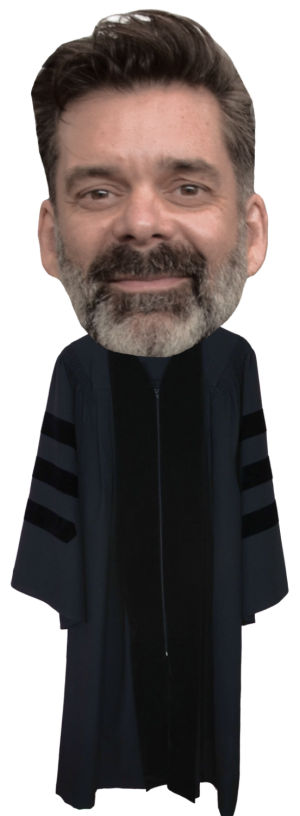 “I’ve always had an interest in the Civil War and Reconstruction, even since I was a little kid I would read about it,” Dr. Harris said.
“I’ve always had an interest in the Civil War and Reconstruction, even since I was a little kid I would read about it,” Dr. Harris said.
His dissertation, titled Across the Bloody Chasm: The Culture of Commemoration Among Civil War Veterans, is about how veterans of that conflict differed in the ways they honored and remembered it.
“After the Civil War, veterans got together in different groups…, and depending on what side they were on, they had very different ways,” Dr. Harris said. “They emphasized certain things, and deemphasized certain things.
“They tried to preserve the memories of their cause in the very best light possible.”
His dissertation was published by the Louisiana State University Press, and Dr. Harris is still publishing articles about the Civil War in different historical Civil War journals.
Dr. Avi Helfand, who teaches the upperclassmen Law, Religion and the American Jewish Community class, received his Ph.D. in Political Science 2009 from Yale University, where he also received his J.D. — his law degree, or Juris Doctor — in 2007.
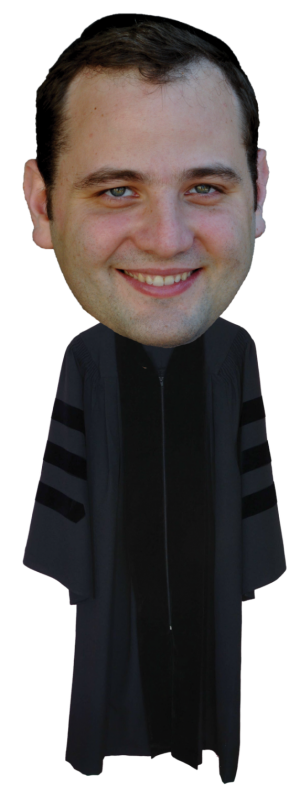 His dissertation, called A Liberalism of Sincerity: Lockean Toleration and the Internal Point of View, focused both on how individuals should have personal freedom, and how the implications of this affect our society. He created an original theory of toleration that “builds on liberal theories that believe governments derive their legitimacy from the consent of their citizens.”
His dissertation, called A Liberalism of Sincerity: Lockean Toleration and the Internal Point of View, focused both on how individuals should have personal freedom, and how the implications of this affect our society. He created an original theory of toleration that “builds on liberal theories that believe governments derive their legitimacy from the consent of their citizens.”
But Dr. Helfand sees this as creating a problem.
“If government power and authority is all about the consent of the citizens, then those citizens can consent away their individual liberties in exchange for promises of security and orderliness,” he said.
His theory responds to this dilemma. He said his idea is that, “individuals have a political obligation to be sincere on matters of core concern–to remain true to who they are and what they believe.”
Building on the philosopher John Locke’s theory of tolerance, Dr. Helfand argues that it is this political obligation of sincerity that prevents people from consenting away their rights.
“John Locke believed that each person must be ‘orthodox to himself,’ which means you can’t authorize government to make you act in a way inconsistent with your beliefs and identity,” he said. “That would ultimately lead to the individuals being insincere.”
When Dr. Helfand is not at Shalhevet, he is a law professor at Pepperdine University Law School, and has been published in the Yale Law Journal, Duke Law Journal, The Wall Street Journal and Los Angeles Times, among other publications.
He said he mostly writes about religious law and religious liberty, and its relationship to the U.S. constitution.
Rabbi Abraham Lieberman, who joined the faculty this year, originally started his dissertation for his Ph.D. in Rabbinics from Yeshiva University in 1987, but never finished it. He long ago completed all his coursework and language tests, and recently decided to go back to completing his research.
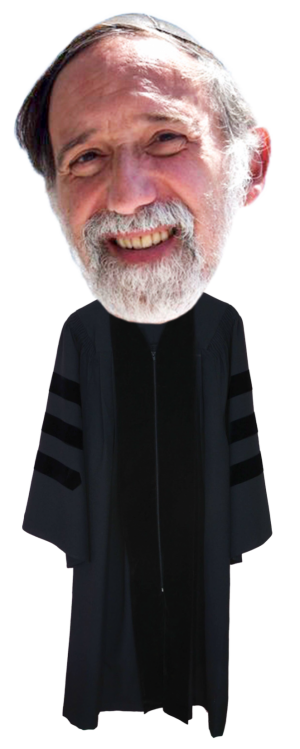 He is studying the commentary of Rabbeinu Baruch, a rishon (commentator who lived between 1050-1500) who was born in Greece, ended up in Syria and wrote commentaries on parts of the Talmud. Rabbi Lieberman is studying his methodology, his influence and the way he saw the Halachic process.
He is studying the commentary of Rabbeinu Baruch, a rishon (commentator who lived between 1050-1500) who was born in Greece, ended up in Syria and wrote commentaries on parts of the Talmud. Rabbi Lieberman is studying his methodology, his influence and the way he saw the Halachic process.
He chose Rabbeinu Baruch because he has never really been researched before. Rabbi Lieberman wanted to look at him systemically and study the halachic implications of what he wrote. Rabbeinu Baruch focused on halachic process, and used a process different from Rashi and Tosafot.
He hopes to finish it within the next two to three years.
“If I could hide somewhere for eight months, I could probably finish it,” Rabbi Lieberman said. “There’s a plan of what has to be done, it just has hasn’t been done yet.”
Rabbi Lieberman decided to go back and finish his dissertation a couple of months ago, while transitioning from his former post as Head of School at YULA Girls High School to his new position at Shalhevet.
Dr. Walton received his Ed.D. from UCLA in 2014 in Educational Leadership, and his dissertation, called The Price of Independence: Tuition, Annual Giving, Endowments and Financial Aid in Independent Schools, looked at qualitative research and quantitative research on tuition price, endowment, percent of students on financial aid, annual giving and how those factors intersect in budget and financial aid decisions. 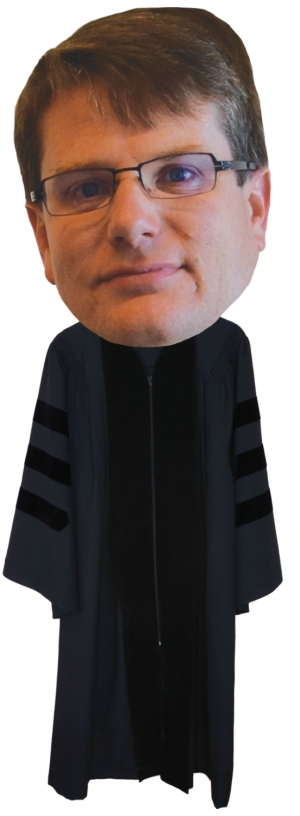
“My dad was a private school teacher,” Dr. Walton said. “I obviously benefited from financial aid being a faculty kid. There’s no way we could have afforded the tuition, so financial aid has always been very near and dear to my heart.”
In his research, Dr. Walton learned that prior to the 2008 recession, an average of 20 percent of students were on financial aid, but after the recession schools became more generous with their giving. He also learned that a large endowment does not correlate with providing generous financial aid, whereas usually schools that raise a lot for their annual giving fund are the most generous.
“If you have a big endowment it will matter, but a million-dollar endowment won’t matter,” Dr. Walton said. “But if you can raise a million dollars each year, that’s going to have a much larger impact.”
Dr. Noam Weissman received his Ed.D. last June from USC in Educational Psychology, specifically in curriculum design. He said he wrote his dissertation, about how to teach Israel education in today’s world, every morning for 16 months from 4:20 to 6:40 AM.
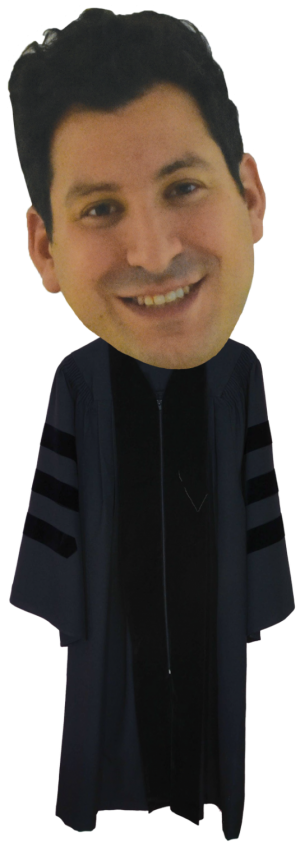 He said he had noticed that there was no formal or agreed-upon Israel education curriculum, despite there being many classes and courses, and therefore decided to write one himself — discovering a lot about himself on the way.
He said he had noticed that there was no formal or agreed-upon Israel education curriculum, despite there being many classes and courses, and therefore decided to write one himself — discovering a lot about himself on the way.
“Re-learning all of the history, different narratives and perspectives changed me as a person and really allowed me to be much more passionate about Zionism than I ever was, and I didn’t think that was possible,” Dr. Weissman said.
Dr. Noam Weissman said he learned two lessons — one about teenagers and their thought processes, and one about his personal Zionism.
“Understanding and really going through an analysis of the identity development of teenagers is a process, and not something that is a given,” Dr. Noam Weissman said, “and it’s not something that many educators pay enough attention to.
“We all have to go through identity challenges in order to arrive at identity achievement,” he continued. “Educational Psychology is understanding how humans are motivated, how people acquire knowledge, how organizations function. It’s one thing to experience it, and it’s another thing to understand the theories of how students learn, how students feel, and how students can get motivated.”
General Studies Principal Mr. Daniel Weslow is hoping to finish his Ed.D. at Pepperdine University in February or March. He started it back in 2007, but had to step away from it for a variety of personal reasons and has now gotten back to it and is almost done.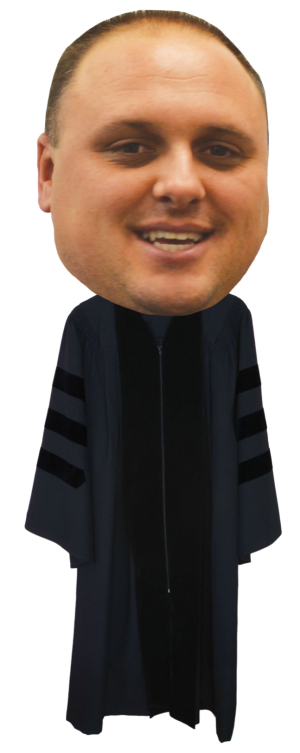
Mr. Weslow’s dissertation focuses on students’ transitions to high school between eighth and ninth grade in private schools, independent schools, Jewish schools and Catholic schools.
“My entire career I’ve been in middle schools or high schools or running secondary schools,” Mr. Weslow said, “so I’ve seen the interactions between students, parents and faculty in different stakeholders with that transition and how significant it is.”
He is studying how students adapt, how faculty is involved and assists and how the transition affects parents.
He hasn’t formulated his thesis yet, but his evolving observation is that no two schools approach the transition the same way — that each school has its own way of acclimating ninth-graders, and that regardless of institutional values, norms and priorities, there’s a thoughtful process.
“It’s always changing to improve, with students’ success and support being the number one priority,” said Mr. Weslow.
All nine of the teachers struggled or are struggling to balance their dissertations and family life.
Dr. Noam Weissman said his dissertation took a toll.
“I don’t think I was healthy for three years,” he said. “It’s something that I’m trying to get better at. I definitely saw my family less.”
Like Dr. Weissman, Mr. Weslow wakes up early in the morning, but he uses that morning time to read the paper or catch up on TV. When he gets home from work, he turns his phone off for 90 minutes to be present for his family, and then will work on his dissertation four nights a week, especially on weekends.
